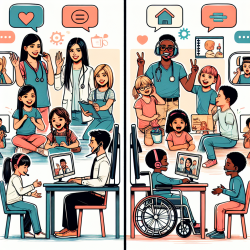Introduction
The COVID-19 pandemic has transformed the way children engage with the world, particularly through increased screen time. This shift has prompted concerns among educators and caregivers about the impact of screen exposure on young children's emotional and cognitive development. A recent study titled "Preschool children’s screen time during the COVID-19 pandemic: associations with family characteristics and children’s anxiety/withdrawal and approaches to learning" sheds light on these dynamics, providing valuable insights for practitioners aiming to enhance children's learning outcomes and well-being.
Understanding the Study
The study examined the screen time of preschool children in Wuhan, China, during the pandemic, focusing on the relationship between screen use, family characteristics, and children's anxiety and learning behaviors. The research found that children who engaged more with interactive screens, like tablets and smartphones, exhibited higher levels of anxiety and withdrawal, along with fewer positive learning behaviors. Conversely, noninteractive screen use, such as watching TV, was associated with lower anxiety levels.
Key Findings and Implications
- Interactive vs. Noninteractive Screen Time: Interactive screen time was linked to increased anxiety and withdrawal symptoms, whereas noninteractive screen time was associated with reduced anxiety. This suggests that the nature of screen interaction plays a crucial role in children's emotional responses.
- Family Environment: Children from chaotic households with fewer screen time restrictions spent more time on screens. This highlights the importance of structured routines and parental involvement in managing screen time.
- Learning Approaches: Increased interactive screen time correlated with diminished positive learning approaches. This indicates that excessive interactive screen use may detract from valuable cognitive activities and motivation to learn.
Practical Applications for Practitioners
For practitioners working with young children, these findings underscore the need for balanced screen time management. Here are some strategies to consider:
- Encourage Structured Screen Time: Help families establish clear rules and routines around screen use, emphasizing quality over quantity. Encourage interactive screen activities that promote learning and social interaction.
- Promote Non-Digital Activities: Suggest alternative activities that stimulate cognitive and emotional development, such as reading, outdoor play, and creative arts.
- Support Parental Involvement: Educate caregivers on the benefits of co-viewing and engaging with children during screen time to enhance learning and reduce anxiety.
Encouraging Further Research
While this study provides valuable insights, further research is needed to explore the long-term effects of screen time on children's development. Practitioners are encouraged to stay informed about emerging studies and integrate evidence-based practices into their work with children and families.
To read the original research paper, please follow this link: Preschool children’s screen time during the COVID-19 pandemic: associations with family characteristics and children’s anxiety/withdrawal and approaches to learning.










